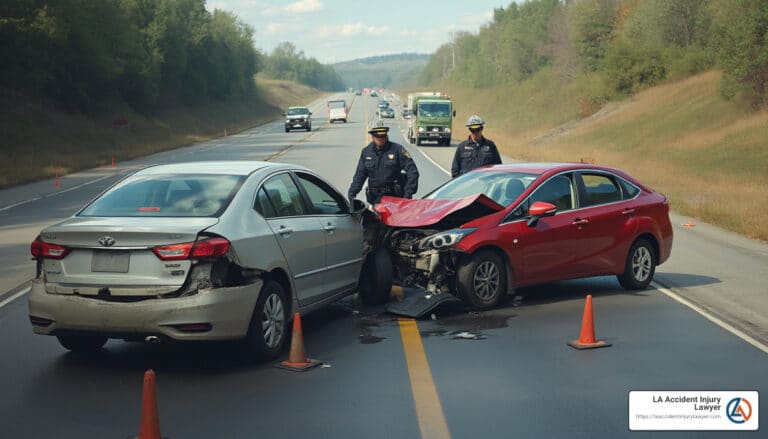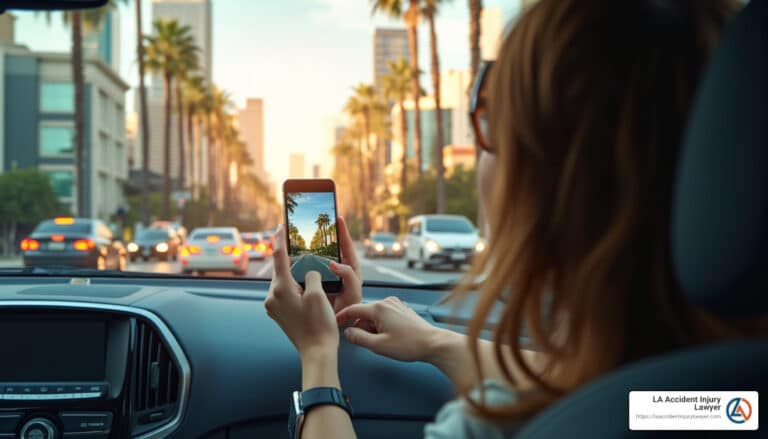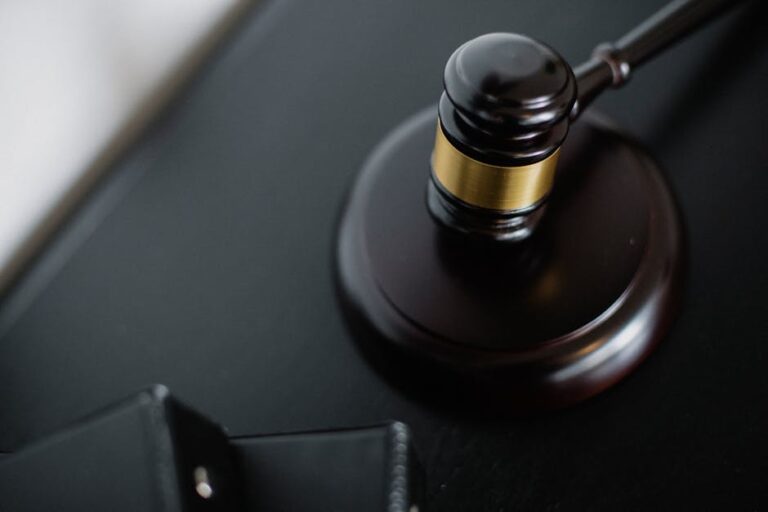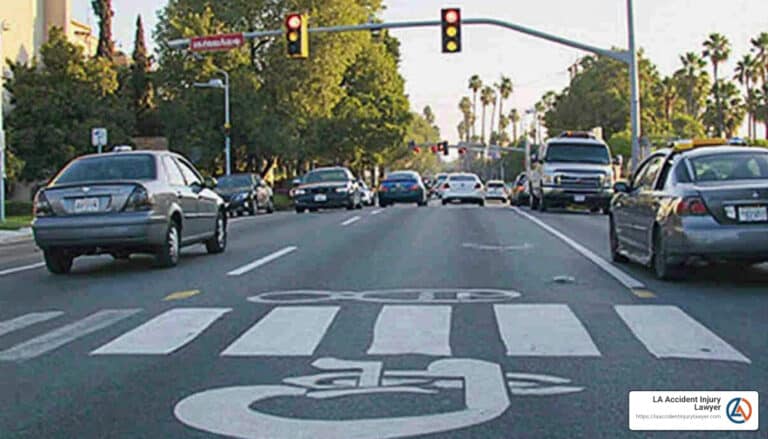How to claim compensation after a car accident can be a daunting question, especially when struggling with the immediate aftermath of a crash in busy cities like Los Angeles. If you’re worried about understanding your rights and securing fair compensation, here’s a quick look at what you need to do:
- Seek Immediate Medical Attention: Your health is the top priority, even if injuries aren’t apparent right away.
- Gather Vital Evidence: Photos, witness contacts, and official police reports are crucial.
- Consult a Personal Injury Lawyer: Professional legal help ensures you understand the claims process and options available.
- File a Claim Promptly: Act within the statutory limits to initiate your compensation process.
In the busy environment of Los Angeles, car accidents occur more often than we’d like. Knowing how to handle the legal aftermath can be overwhelming but is essential for securing the compensation you deserve. Accidents bring potential financial strains from medical bills to vehicle repairs, which can be claimed when the other driver is at fault. Engaging a Los Angeles accident & injury lawyer can make a significant difference, helping to avoid insurance pitfalls and ensuring all possible damages are addressed.
Understanding Car Accident Damages
When you’re involved in a car accident, understanding the types of damages you can claim is crucial. Let’s break down the main categories of damages you might encounter:
Medical Costs
Medical expenses can quickly add up after a car accident. These costs include emergency room visits, surgeries, rehabilitation, and even long-term care if necessary. It’s essential to keep detailed records of all medical treatments, as these will be critical when filing your claim. Medical costs often form a substantial part of your compensation claim.
Lost Wages
If your injuries prevent you from working, you might be eligible to claim lost wages. This isn’t just about your salary; it includes potential raises, promotions, and benefits you might miss out on due to your absence. To prove lost wages, you’ll need documentation like pay stubs and a doctor’s note explaining why you can’t work.
Property Damage
Property damage goes beyond just your vehicle. It can include any personal property inside your car that was damaged during the accident. To claim these damages, collect evidence such as photos of the damage and repair estimates. This helps in negotiating the cost of repairs or replacement with the at-fault driver’s insurance company.
Non-Economic Damages
Non-economic damages cover more subjective losses, like pain and suffering or emotional distress. These damages don’t have a set dollar amount, making them complex to calculate. Factors like the severity of your injuries and their impact on your quality of life influence the compensation amount. In states like Georgia, there’s no cap on these damages, which can be a significant part of your claim.
Wrongful Death
In tragic cases where a loved one passes away due to a car accident, wrongful death damages can be sought. These damages cover medical bills, funeral costs, and loss of companionship. A wrongful death claim can provide financial relief during a difficult time, helping to cover the costs associated with the loss.
Understanding these damages is vital for anyone looking to claim compensation after a car accident. Knowing what you can claim helps ensure you receive fair compensation for your losses.
How to Claim Compensation After a Car Accident
Navigating the aftermath of a car accident can be overwhelming, but knowing how to claim compensation can ease some of the stress. Here’s a step-by-step guide to help you through the process:
Start with an Insurance Claim
Your first step is to file an insurance claim. This involves contacting the at-fault driver’s insurance company to report the accident and begin the claims process. Insurance companies will investigate the accident to determine liability and calculate damages. Make sure to provide them with all the necessary information, including the police report and contact details of any witnesses.
Crafting a Demand Letter
Once you’ve gathered all your evidence, it’s time to write a demand letter. This letter outlines your damages and the compensation you seek. It should include:
- A detailed account of the accident
- A list of medical treatments and costs
- Documentation of lost wages
- Evidence of property damage
A well-crafted demand letter is crucial. It sets the stage for negotiations with the insurance company and shows you are serious about your claim.
Collecting Evidence
Evidence is the backbone of your compensation claim. Collect as much as you can, including:
- Photos of the accident scene and vehicle damage
- Medical records and bills
- Pay stubs to prove lost wages
- Witness statements
Having a comprehensive collection of evidence strengthens your case and can help expedite the settlement process.
Identifying the At-Fault Driver
Determining who is at fault is critical. The at-fault driver’s insurance is responsible for covering your damages. In some cases, fault may be shared, which can affect the amount you receive. For instance, in states with comparative fault laws, your compensation may be reduced by your percentage of fault.
Insurance companies might try to minimize their payout. Stay persistent and consider consulting a personal injury lawyer if negotiations become challenging.
By following these steps, you can better steer how to claim compensation after a car accident and work towards receiving the compensation you deserve.
Next, we’ll explore the immediate actions you should take following an accident to protect your rights and strengthen your claim.
Steps to Take Immediately After an Accident
When you’re involved in a car accident, your actions in the moments that follow can significantly impact your ability to claim compensation later. Let’s walk through the immediate steps you should take to ensure your rights are protected and your claim is solid.
1. Contact the Police
First things first, call the police. A police report is a crucial piece of evidence when claiming compensation. It provides an official account of the accident, which can be invaluable in proving what happened. Make sure to get the name and badge number of the responding officer and ask how you can obtain a copy of the report.
2. Exchange Driver Information
Gather information from all drivers involved. This includes:
- Names and contact information
- Driver’s license numbers
- Insurance company names and policy numbers
- Vehicle registration details
Checking these details against the driver’s license and vehicle registration can prevent errors or fraud.
3. Collect Witness Statements
Witnesses can provide unbiased accounts of the accident. If there are any bystanders, politely ask for their contact information and a brief statement of what they saw. Their testimonies can be crucial if there are discrepancies in the accounts of those involved in the accident.
4. Take Accident Photos
Use your phone or a camera to take clear photos of the accident scene. Capture:
- Vehicle damage from multiple angles
- License plates
- Traffic signs and signals
- Any skid marks or road conditions
Photos serve as visual evidence that can support your claim and help reconstruct the event if needed.
By diligently following these steps, you lay a strong foundation for your compensation claim. Taking immediate action ensures that vital evidence is preserved and can be effectively used to support your case as you move forward in the claims process.
Next, we’ll dive into some frequently asked questions about car accident compensation to further clarify your path to recovery.
Frequently Asked Questions about Car Accident Compensation
When you’re navigating the aftermath of a car accident, understanding the ins and outs of compensation claims is crucial. Let’s address some common questions that can help guide you through this process.
How long do I have to file a claim?
Time is of the essence when it comes to filing a claim after a car accident. The statute of limitations sets a deadline for how long you have to initiate legal action. In California, you typically have two years from the date of the accident to file a personal injury claim. For property damage claims, the deadline extends to three years. Missing these deadlines can jeopardize your ability to recover compensation, so it’s important to act promptly.
What types of damages can I claim?
After a car accident, you may be eligible for various types of damages. These fall into two main categories:
-
Compensatory Damages: These are intended to cover actual losses. They include:
- Medical Expenses: Past, present, and future costs related to your injuries.
- Lost Wages: Compensation for income lost due to the inability to work.
- Property Damage: Costs to repair or replace your vehicle and personal items.
-
Non-Economic Damages: These are more subjective and cover intangible losses such as:
- Pain and Suffering: Physical pain and emotional distress.
- Loss of Enjoyment of Life: Impact on your ability to enjoy daily activities.
The exact amount you can claim depends on the specifics of your case and the severity of your injuries.
Should I accept the initial settlement offer?
Insurance companies often make initial settlement offers quickly after an accident. While it might be tempting to accept this offer and move on, it’s crucial to be cautious. These offers are typically lower than what you might be entitled to because insurers aim to minimize their payouts.
Engaging in settlement negotiation can lead to a more favorable outcome. By consulting with a knowledgeable car accident lawyer, you can assess the true value of your claim. This ensures that you don’t settle for less than you deserve. Once you accept an offer, you forfeit the right to pursue further compensation.
Next, we’ll explore how having the right legal representation can make a significant difference in your compensation claim journey.
Conclusion
Navigating the aftermath of a car accident can be overwhelming, but having the right legal representation can make all the difference. At LA Accident Injury Lawyer, we understand the complexities involved in claiming compensation and are dedicated to helping you every step of the way.
Our firm offers a free consultation, so you can explore your options without any financial commitment. This initial meeting allows us to understand the specifics of your case and provide you with custom advice on how to proceed. We believe you should focus on your recovery while we handle the legal intricacies.
One of our key commitments is that you don’t pay unless we win. This “no fee unless we win” policy underscores our confidence in securing the best possible outcome for your case. It also ensures that our interests align with yours—we only succeed when you do.
By choosing us, you’re not just getting a lawyer; you’re getting a team dedicated to fighting for your rights and ensuring you receive the compensation you deserve. Whether it’s dealing with insurance companies or negotiating settlements, our experience and expertise are at your service.
If you’ve been in a car accident and need help with your compensation claim, don’t hesitate to contact us today. Let us be your advocate on the road to recovery.
The right legal guidance can be the key to turning a difficult situation into a successful resolution. We’re here to help, every step of the way.







